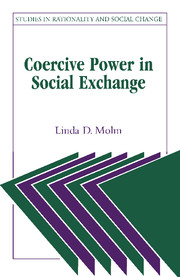Book contents
- Frontmatter
- Contents
- LIST OF FIGURES AND TABLES
- PREFACE AND ACKNOWLEDGMENTS
- 1 Introduction and overview
- 2 Social exchange and power
- 3 Punishment and coercion
- 4 An experimental setting for studying power in exchange relations
- 5 The early research: experimental tests and theoretical puzzles
- 6 The structural determination of power use
- 7 Dependence and risk: structural constraints on strategic power use
- 8 Injustice and risk: normative constraints on strategic power use
- 9 The effects of coercion: compliance or conflict?
- 10 A theory of coercion in social exchange
- 11 Conclusions and implications
- APPENDIX I Definitions of basic concepts of social exchange
- APPENDIX II The experimental instructions for the standardized setting
- REFERENCES
- NAME INDEX
- SUBJECT INDEX
1 - Introduction and overview
Published online by Cambridge University Press: 06 July 2010
- Frontmatter
- Contents
- LIST OF FIGURES AND TABLES
- PREFACE AND ACKNOWLEDGMENTS
- 1 Introduction and overview
- 2 Social exchange and power
- 3 Punishment and coercion
- 4 An experimental setting for studying power in exchange relations
- 5 The early research: experimental tests and theoretical puzzles
- 6 The structural determination of power use
- 7 Dependence and risk: structural constraints on strategic power use
- 8 Injustice and risk: normative constraints on strategic power use
- 9 The effects of coercion: compliance or conflict?
- 10 A theory of coercion in social exchange
- 11 Conclusions and implications
- APPENDIX I Definitions of basic concepts of social exchange
- APPENDIX II The experimental instructions for the standardized setting
- REFERENCES
- NAME INDEX
- SUBJECT INDEX
Summary
Over the course of a 15-year period, a group of social exchange theorists (Blau 1964; Emerson 1962, 1972b; Homans [1961] 1974; Thibaut and Kelley 1959) developed a theory of power that differed markedly from prevailing conceptions in the social sciences. Their view of power derived from exchange theory's emphasis on the ties of mutual dependence that underlie all social structures. People depend on one another for much of what they value and need in social life, and they provide these benefits to each other through the process of social exchange – offering, for example, status in exchange for leadership, loyalty for friendship, patronage for political support, and esteem for advice.
Not only does mutual dependence bring people together, however; it also provides the structural basis for power: one actor's dependence is the source of another's power. To the extent that dependence is mutual, actors in social relations have power over each other. And, to the extent that their dependencies are unequal, their relation will also be unequal, in terms of the benefits that each contributes and receives. More powerful, less dependent actors will enjoy greater benefits at lower cost.
When compared with more traditional conceptions of power as coercive (e.g., Bierstedt 1950; Weber 1947), the exchange theorists' view of power is strikingly benign. Common stipulations in definitions of power, such as intentionally imposing one's will on another, overcoming resistance, and making others behave contrary to their own interests, are notably absent.
- Type
- Chapter
- Information
- Coercive Power in Social Exchange , pp. 1 - 10Publisher: Cambridge University PressPrint publication year: 1997



